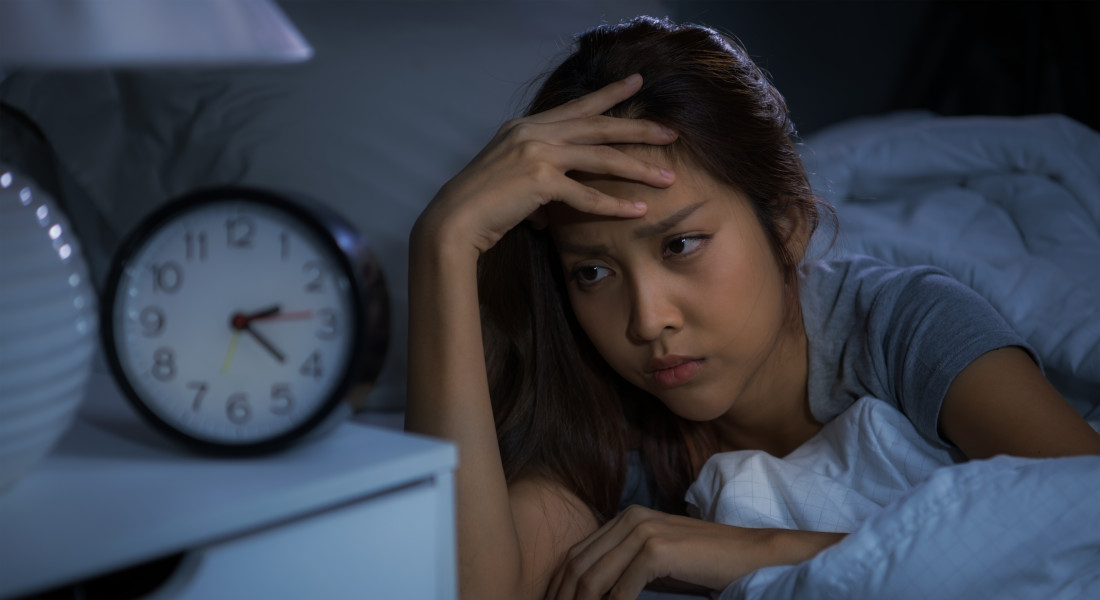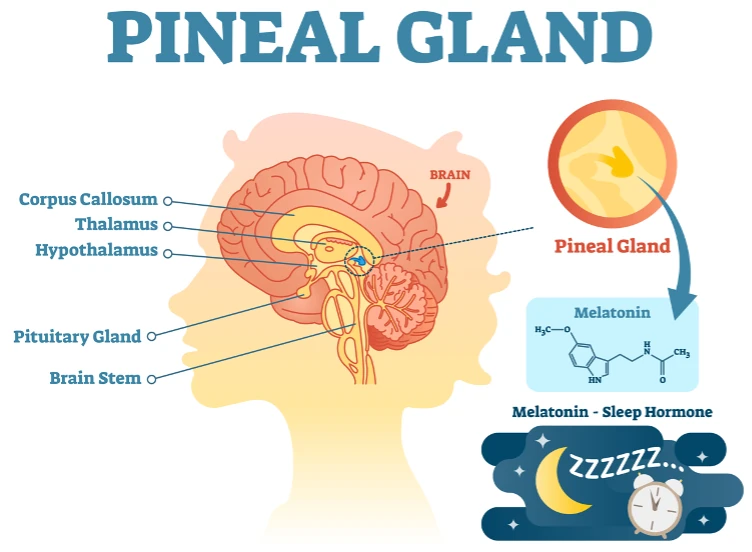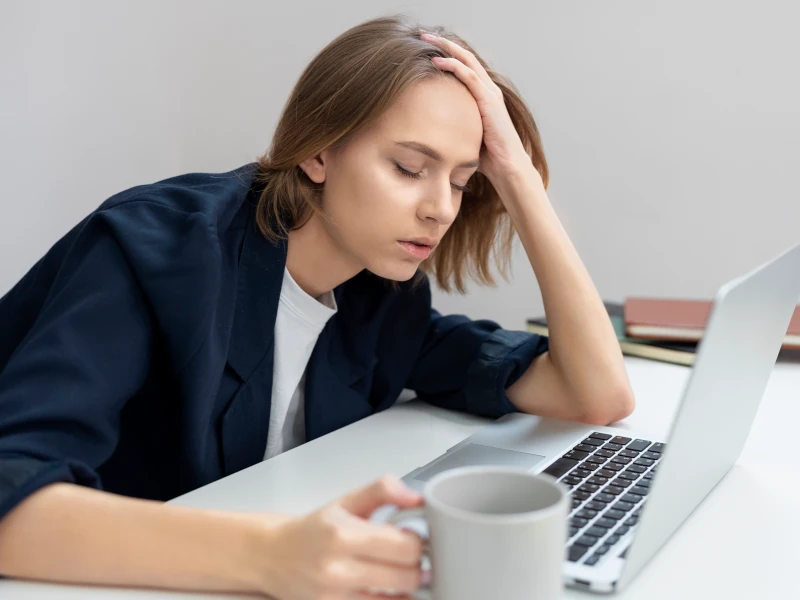There can be many causes for struggling to fall asleep. These reasons could be related to your age, lifestyle, any medications you take or even an underlying health disorder.
It is crucial to have an adequate amount of sleep every night. Generally speaking, it is recommended for an adult to sleep more than 7 hours per night. It is important to remember that sleep requirements vary from person to person, and can change over time. Poor sleep may result in:
- Accidents
- Mood changes
- Memory issues
- Poor concentration
- Weight gain
- Risk of diabetes
- High blood pressure
- Risk of heart disease
- Low sex drive
- Weakened immunity
So, what can you do at home to help fall asleep at night?
13 ways to help fall asleep at night
1. Maintain good sleep hygiene
Forming good sleep habits is crucial to better sleep at night. Here are some general guidelines to help you develop good sleeping habits:
Set a sleep schedule
- Have a fixed wake-up and only go to bed when you are feeling sleepy.
- Focus on making sleep a priority.
Have a night routine
- Curate a night routine that works for you and helps you wind down after a busy day at work.
- Consider switching off from social media, brightly lit electronic devices and consider reading a book or listening to relaxing music instead.
Optimise your bedroom and sleeping environment
- Consider your needs and choose the best mattress, pillow and bedding appropriately.
- Set your bedroom to a cool yet comfortable temperature.
- Block out light, and consider using an eye mask.
- If you find your environment too noisy, consider using earplugs.
- Try calming scents such as lavender, which may help you relax.
2. Avoid caffeine and alcohol, especially in the evenings
Alcohol and coffee may both cause you to stay up at night. Whilst alcohol can make you feel sleepy, in some cases, you may have to wake up multiple times in the night to visit the bathroom.
Coffee contains caffeine. This blocks the adenosine receptors which play a role in making you feel sleepy. Thus, avoid having any form of caffeine at least 6 hours before bed.
The American Academy of Sleep Medicine also recommends avoiding energy drinks, sodas and water close to bedtime. Read more here.
3. Avoid using a screen shortly before bed
Electronic devices such as mobile phones, laptops, PCs, tablets and TVs emit blue light. Blue light suppresses the production of melatonin (a hormone), which promotes sleep. This makes it harder to fall asleep.
4. Listen to relaxing music
The ability to hear comes from a series of steps that convert sound waves coming into the ear into electrical signals for the brain to interpret. Several studies have shown that listening to music can help regulate hormonal levels, including cortisol, the stress hormone. Listening to music decreases cortisol levels, which may explain why music effectively puts people at ease and reduces stress.
Well, what type of music should you listen to help you sleep? Research has looked at various genres and playlists without a clear consensus. A self-curated playlist or one created with sleep in mind works best.
When creating your playlist, tempo is one of the most important factors. The tempo or speed of the music is often measured in beats per minute (BPM). Most research has tended to use music with a 60-100 BPM tempo as normal heart rates range between 60-100 BPM. This is because it’s hypothesised that the body can ‘sync’ with the tempo of the music.
Avoid songs which may elicit strong emotional reactions. Also, avoid listening to music at higher volumes, as headphones and earbuds may cause damage to the ear and surrounding structures if played at a high volume. Use a small speaker or stereo near the bed without bright lights and set it to a soothing volume where possible.
5. Mindfulness and meditation
Meditation techniques often combine mental and physical aspects of our health. Thus, by targeting anxious, stressful thoughts alongside a physically stressed body, meditation can help us reach an overall state of relaxation.
Mindfulness and meditation can help people sleep in different ways, such as slowed breathing, calmed stress pathways, and improved mental health.
Some popular methods of meditation to help fall asleep are:
Yoga
There are various yoga techniques, but most focus on a core set of principles: mindfulness meditation, diaphragmatic breathing and stretching poses. New evidence shows that yoga nidra, a type of yoga that induces a sleep-like state, may improve sleep quality, duration and reduce time spent awake in bed.
Mindfulness meditation
This involves concentrating on the present and allowing yourself to experience emotions and thoughts without judgement. Mindfulness may help a person relax at bedtime and improve sleep quality.
6. Exercise during the day
Adding physical activity during the daytime can over the long term help improve your sleep. I recommend doing 20-30 minutes daily to improve your sleep quality. Avoid strenuous exercise 3 hours before sleep.
7. Consistent sleep-wake schedule
Follow a consistent sleep-wake schedule where possible. Research has shown that waking up at the same time is associated with better sleep quality. A 2020 systematic review has also shown that people with variability in their sleep-wake schedules had poorer health outcomes.
8. Treat any underlying health issues
In some cases, poor sleep may be caused due to an underlying health condition. If you suspect this is the case, it is important to be reviewed by a medical doctor as soon as possible. Common underlying sleep disorders that cause poor sleep include:
a) Insomnia is when you regularly have difficulty falling asleep.
b) Sleep apnoea is when your breathing stops and starts while you sleep. The most common type is called obstructive sleep apnoea (OSA).
c) Restless leg syndrome is a common nervous system condition that causes an irresistible urge to move your legs.
9. Controlled breathing
There are different breathing techniques that you could try to help you sleep. These techniques work because slow and deep breaths enable a sense of calm. This is also known as pranayamic breathing; it can reduce stress on the nervous system and prepare the brain and body for sleep by reducing excitatory triggers.
Below is a list of various activities that may help you fall asleep easier. You don’t need to follow all of them. I recommend figuring out which ones you like and work best for you.
- Counting Breaths
- Belly Breathing
- Box Breathing
- Alternate Nostril Breathing
10. Read a book or journal
Try picking up a fiction or non-fiction book to read every night. This can help to create a calm environment and allow your body to relax before you sleep. Reading a book is preferable to using electronic devices, because blue light can delay sleep onset.
Journaling before bed to move your thoughts from the day out of your mind and onto paper. This is a good way of easing up from the ‘burden’ of our daily lives and jobs. It often releases stress and gives you a clearer head as you prepare for bed.
11. Hide your clock
Clocks are great for telling the time. They are great for setting alarms and getting you out of bed. However, being able to constantly check the time whilst trying to fall asleep only increases your stress. This may subconsciously make it harder for you to ‘switch off’ and relax at night.
Avoid having the clock face in a place where it is in your eyesight constantly, if possible.
12. Avoid daytime naps
The sleep cycle of a healthy adult is split into four distinct stages. Morning naps primarily consist of light non-rapid eye movement (NREM) and possibly some rapid-eye movement (REM) sleep. If you nap towards the afternoon or later in the evening, due to an increased sleep drive across the day, your nap is more likely to comprise of deep sleep. This can disrupt your ability to sleep well at night.
Some alternatives to taking a nap:
- Exposure to bright light during periods of tiredness can help keeps naps at bay
- Stand up, walk or take some gentle exercise
13. Follow a healthy diet
Healthy eating habits can have a positive impact on sleeping patterns. Try to eat a balanced diet where possible – one rich in fibre, vitamins, fresh fruits, veg, whole grains and low-fat proteins. Avoid foods with added sugars.
Consider eating foods high in B vitamins, as these have been shown to regulate melatonin.
Healthier eating habits can also lead to weight loss, which could help improve conditions such as obstructive sleep apnoea.
Still struggling to sleep? Talk to a specialist
The quest for good quality and a sufficient quantity of sleep can sometimes be elusive. For some people, the above techniques may not be enough, especially if there is an underlying physical health issue, mental health difficulty or a sleep condition causing someone to struggle to fall asleep. These would need to be addressed to allow you to return to good-quality sleep.
As a sleep physician and psychiatrist, I can help you identify the root cause (or causes) for your sleeping difficulties, and guide you towards taking the right steps to get your sleep back on track. Please feel free to get in touch if you would like to have a consultation to discuss your sleeping difficulties.










